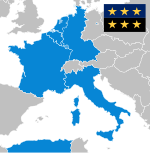Portal:European Union
Introduction
The European Union (EU) is a supranational political and economic union of 27 member states that are located primarily in Europe. The Union has a total area of 4,233,255 km2 (1,634,469 sq mi) and an estimated total population of over 449 million. The EU has often been described as a sui generis political entity (without precedent or comparison) combining the characteristics of both a federation and a confederation. Containing 5.8% of the world population in 2020, EU member states generated a nominal gross domestic product (GDP) of around US$16.6 trillion in 2022, constituting approximately one sixth of global nominal GDP. Additionally, all EU states except Bulgaria have a very high Human Development Index according to the United Nations Development Programme. Its cornerstone, the Customs Union, paved the way to establishing an internal single market based on standardised legal framework and legislation that applies in all member states in those matters, and only those matters, where the states have agreed to act as one. EU policies aim to ensure the free movement of people, goods, services and capital within the internal market; enact legislation in justice and home affairs; and maintain common policies on trade, agriculture, fisheries and regional development. Passport controls have been abolished for travel within the Schengen Area. The eurozone is a group composed of the 20 EU member states that have fully implemented the economic and monetary union and use the euro currency. Through the Common Foreign and Security Policy, the union has developed a role in external relations and defence. It maintains permanent diplomatic missions throughout the world and represents itself at the United Nations, the World Trade Organization, the G7 and the G20. Due to its global influence, the European Union has been described by some scholars as an emerging superpower. In 2012, the EU was awarded the Nobel Peace Prize. The United Kingdom became the only member state to leave the EU, in 2020; ten countries are aspiring or negotiating to join it. (Full article...) Selected article The ECSC was first proposed by French foreign minister Robert Schuman on 9 May 1950 as a way to prevent further war between France and Germany. He declared his aim was to 'make war not only unthinkable but materially impossible.' The means to do so, Europe's first supranational Community, was formally established in 1951 by the Treaty of Paris, signed not only by France and West Germany, but also by Italy and the three Benelux states: Belgium, Luxembourg and the Netherlands. Between these states the ECSC would create a common market for coal and steel. The ECSC was governed by a 'High Authority', checked by bodies representing governments, MPs and an independent judiciary. The ECSC was joined by two other similar communities in 1957, with whom it shared its membership and some institutions. In 1969 all its institutions were merged with that of the European Economic Community (EEC, which later became part of the European Union), but it retained its own independent identity. However in 2002 the Treaty of Paris expired, and with no desire to renew the treaty, all the ECSC activities and resources were absorbed by the European Community. During its existence, the ECSC had succeeded in creating a common market but could not prevent the decline of the coal and steel industries. It did however set the ground for the future European Union. Selected picturePhotograph: JH-man Averbode Abbey, founded about 1134–35 by Count Arnold II of Loon, is a Premonstratensian monastery situated in the Archdiocese of Mechelen-Brussels in Belgium. The abbey reached its peak in the 16th and 17th centuries, though over the past hundred years it has been in a state of decline.
Did you know?...that the President of Ireland, who serves as head of state, is elected for a seven year term and can be re-elected only once? ...that within the Eurozone the European Central Bank has the exclusive authority to set monetary policy? Selected cityLisbon is the capital and largest city of Portugal. It is the seat of the district of Lisbon and capital of Região Lisboa (Lisbon Region). Lisbon municipality has a population of 564,477, and the Lisbon Metropolitan Area in total has around 2,800,000 inhabitants, the largest urban aglomeration of Portugal. Lisbon Region is the wealthiest region in Portugal and it is well above the European Union's per capita GDP average. Lisbon hosts two important European Union agencies namely, the European Monitoring Centre for Drugs and Drug Addiction (EMCDDA) and the European Maritime Safety Agency (EMSA). The CPLP (Community of Portuguese Language Countries), is also headquartered in Lisbon. General imagesThe following are images from various European Union-related articles on Wikipedia.
TopicsFeatured contentFeatured articles
Featured lists
Featured contentGood articles
CategoriesRelated portalsAssociated WikimediaThe following Wikimedia Foundation sister projects provide more on this subject:
Discover Wikipedia using portals |
































































